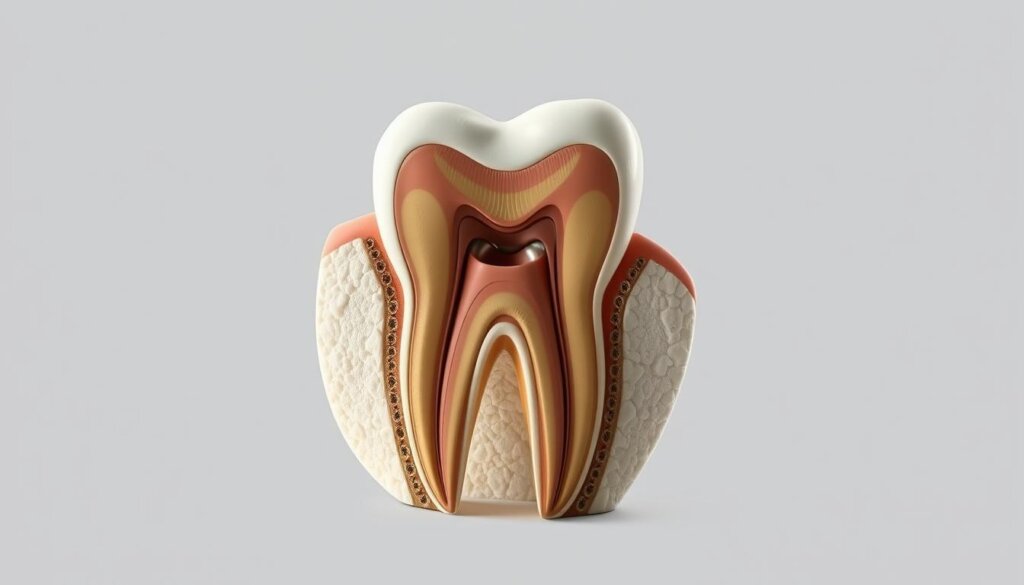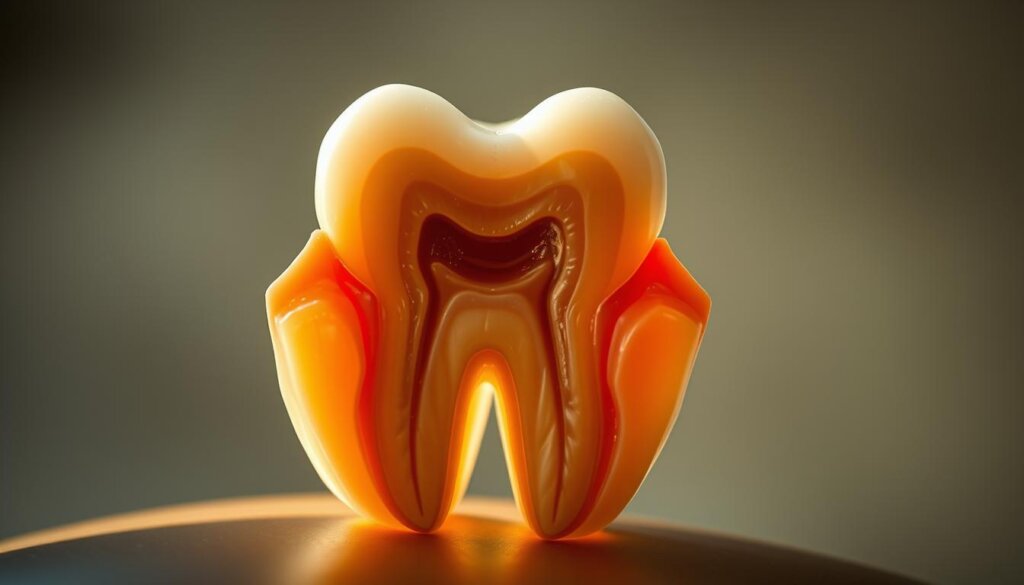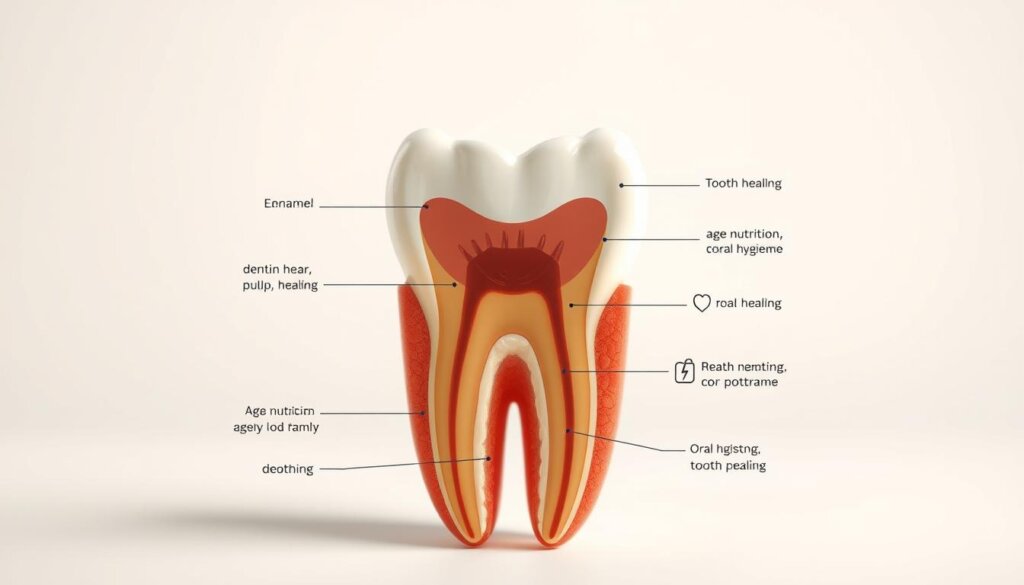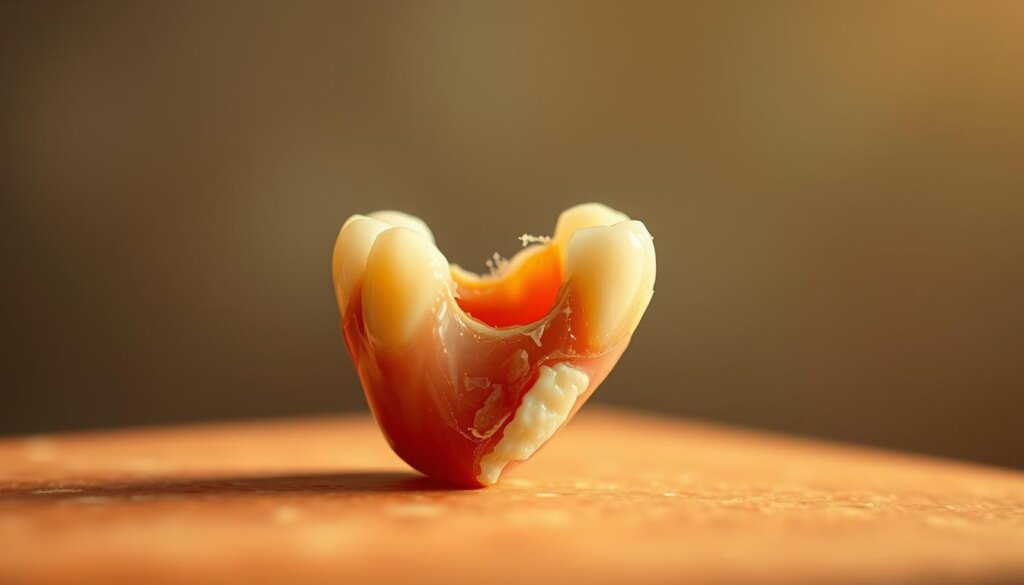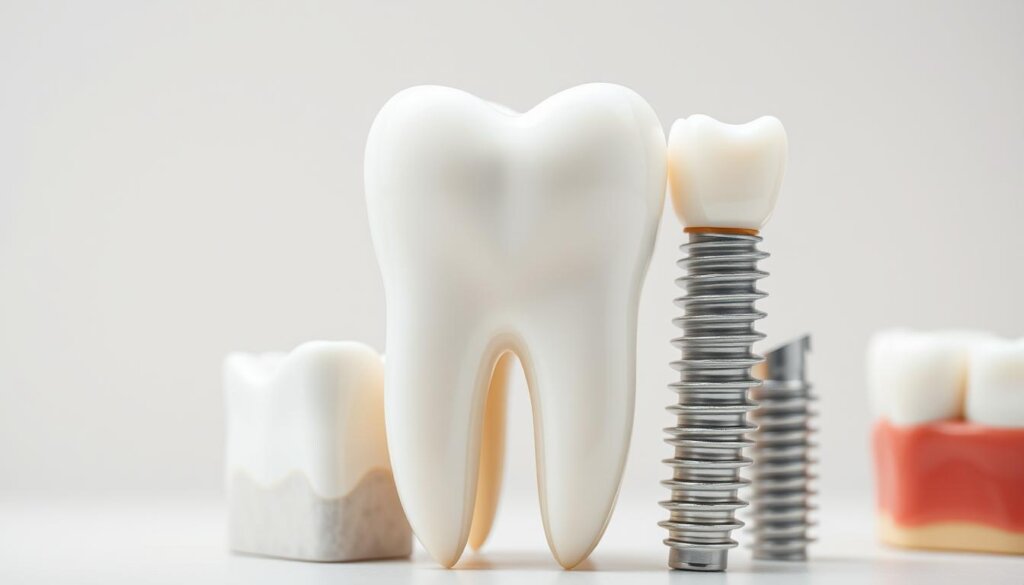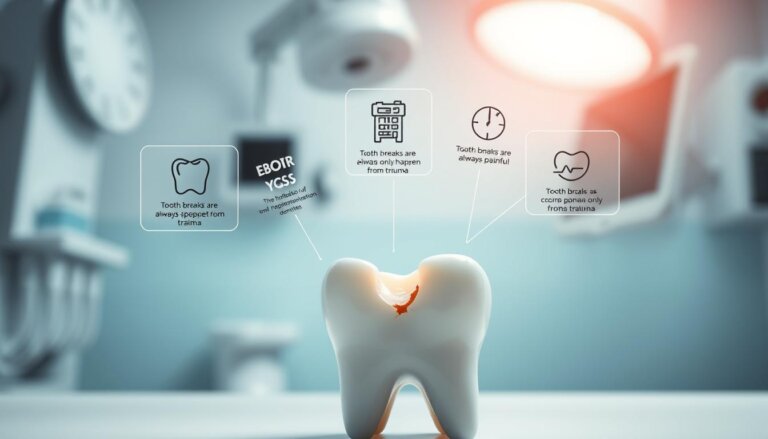Can a Broken Tooth Heal or Fix Itself Over Time?
It’s surprising, but true — nearly 1 in 6 adults has had a broken tooth. This fact raises both interest and worry about dental health. It makes us wonder if a broken tooth can heal on its own. With new discoveries in healing, people are asking if teeth can fix themselves. This brings up a big question: can a broken tooth heal or fix itself over time?
Nowadays, dental care for broken tooth often tries to use the body’s own healing ways. We’re curious about how teeth can repair themselves. Teeth can get different kinds of damage. Some may heal on their own, but others need a dentist’s help. We’ll explore how teeth can sometimes heal with the help of saliva.
Key Takeaways
- The chance of tooth self-repair shows our body’s natural healing and interest in whole health practices.
- Small tooth damage might heal with help from saliva, which can fix tooth enamel within limits.
- Broken tooth healing depends on diet, fluoride, and how well the body can heal.
- Big tooth injuries usually need a dentist dental care for broken tooth right away to avoid more issues.
- Knowing if can a broken tooth heal or fix itself over time requires science. It also requires knowing when to see a dentist.
Understanding Tooth Structure
To truly understand how teeth can heal naturally, it’s important to know about their structure. Each part of the tooth has a special job. This helps the tooth stay healthy and fix itself from small damages like enamel wear.
Enamel, Dentin, and Pulp
A tooth has different layers that are key to its health and strength. The enamel is on the outside. It’s the toughest part of our body and guards against damage. Below that is the dentin, which is softer and supports the enamel. The center of the tooth holds the pulp, which has nerves and blood vessels. This part is vital for feeling and getting nutrients.
Each layer is important for keeping teeth healthy. When the enamel gets weak, the tooth can fix it by adding minerals back. This is called enamel remineralization.
The Role of Each Layer in Healing
Different layers of the tooth heal in various ways. The enamel can fix little bits of damage through remineralization. But if the damage goes beyond the enamel to the dentin, it’s harder to fix. The dentin has tubes that feel pain but can’t heal well. The pulp is full of blood vessels and nerves. If it’s damaged, you might need serious dental work like a root canal.
| Layer | Function | Regenerative Ability |
|---|---|---|
| Enamel | Protects against mechanical stress and chemical erosion | Limited to remineralization |
| Dentin | Supports enamel and carries nutrients | Minimal regenerative capacity |
| Pulp | Contains nerves and blood vessels | Can regenerate nerves and vessels, but at risk of infection |
Types of Tooth Damage
Knowing the different kinds of tooth damage helps in treating and preventing more dental problems. Types of tooth damage include minor issues like chips to serious cracks and fractures that need special dental care for broken tooth.
Cracks, chips, and fractures are common tooth damages. Cracks can happen from biting hard things or from grinding teeth. Chips are usually on the tooth’s edge and often need simple cracked tooth treatment. Fractures, however, can be deep and serious, needing quick, thorough dental care for broken tooth.
Cracks vs. Chips
Cracks and chips are common but affect teeth differently. Cracks can risk the whole tooth, possibly leading to its loss or a root canal. Chips might seem minor but can get worse without care, so quick dental care for broken tooth is vital.
Fractured Teeth Explained
Fractured teeth are severe, with damage going deep into the tooth. They often require treatments like crowns or root canals to fix the look and function of the tooth. This shows why fast action is needed in cracked tooth treatment.
| Damage Type | Description | Common Treatments |
|---|---|---|
| Cracks | Line on the tooth surface, which may deepen over time | Bonding, Crown |
| Chips | Small piece missing, usually on the edge of the tooth | Dental Filling, Veneers |
| Fractures | Crack that extends into the deeper layers of the tooth | Crown, Root Canal |
Quick diagnosis and treatment are key for these types of tooth damage. They keep teeth working well and looking good. Regular dentist visits and protecting your teeth from too much force can avoid many big dental issues.
The Healing Process of Teeth
It’s important to understand how teeth heal in dentistry and oral health. Many of us know our bodies can heal, but teeth are special. They offer unique challenges and chances for natural tooth repair.
Natural repair mechanisms really depend on remineralization. This is when minerals get added back into the tooth’s enamel. It’s key for fighting decay and keeping teeth strong. Saliva is super important here, as it brings minerals like calcium and phosphate to the teeth. This mechanism’s success is key for tooth self-repair.
But, there are big limits to how teeth can heal themselves. Limitations of tooth self-healing are very clear with serious dental damage. Natural repair methods can only fix small enamel issues. They can’t heal big cracks or deep damage to dentin or pulp. Serious damage needs a dentist’s help.
Looking into how teeth heal shows us what’s possible and what’s not. It tells us keeping our teeth clean and healthy helps natural healing. But it also reminds us when we need to see a dentist for bigger problems.
Factors Influencing Tooth Healing
It’s important to know what affects tooth repair and healing to take care of our teeth well. These factors include a person’s age, health, how well they clean their teeth, and what they eat.
Age and Health
As we get older, our bodies don’t heal as fast. Kids and young folks heal quicker because their bodies work faster and make new cells faster. Also, being healthy helps your mouth stay healthy. Illnesses like diabetes and weak bones can make it harder for your mouth to heal.
Oral Hygiene Practices
Good oral hygiene is key to keeping your teeth healthy and healing well. Brushing, flossing, and using fluoride keep your teeth strong and avoid problems. These steps are very important for keeping your mouth healthy.
Nutritional Impact
What you eat matters a lot for your teeth’s health and healing. Eating foods with lots of vitamins, calcium, and phosphate helps fix tooth enamel. But, eating too much sugar and acidic foods can hurt your teeth and slow down healing.
Knowing all about tooth healing shows why personalized dental care is so crucial. A care plan that fits your needs helps keep your mouth healthy and supports your teeth’s ability to heal.
When to Seek Dental Attention
Knowing when to get help for a broken tooth is key to avoiding worse problems. Getting help quickly can improve how well you recover and lessen long-term harm.
Trying to fix a tooth on your own can make things worse. Here are signs you need to see a dentist right away:
- Pain that doesn’t go away with painkillers
- Feeling more sensitive to hot, cold, or pressure
- Seeing signs of infection like swelling, redness, or a bad taste
- Having trouble with everyday things like chewing and talking
Getting dental care quickly after a tooth is damaged is crucial. Waiting can lead to big problems like infection or losing the tooth. These issues are harder to deal with later on.
Seeing a dentist fast lets them check your tooth and decide the best way to fix it. Depending on the damage, you might need something simple or a more detailed treatment. Possible treatments include bonding, crowns, or root canals.
A visit to the dentist not just helps keep the broken tooth in good shape. It also helps keep your whole mouth healthy.
Common Treatment Options for Broken Teeth
There are many ways to fix broken teeth that can make them look and work like new again. Tooth restoration options like fillings and crowns are great for small to moderate damage. But, for deeper issues, root canal treatment might be needed.
- Fillings: Perfect for minor breaks or cavities. They come in materials like composite resin or porcelain, matching your tooth color.
- Crowns: These cover the whole tooth, fixing its look and use. They’re best when the tooth has lost a lot of its structure.
Root Canals and Beyond
When the tooth’s nerve is damaged, root canal treatment is crucial. This process removes the bad nerve, cleans inside, and seals it. Root canals save teeth that might otherwise need removal. For teeth that are really ruined, more complex work might be needed, or perhaps removing the tooth.
The Role of Saliva in Oral Health
Saliva is key in keeping our mouths healthy. It acts like a guardian and a healer for our teeth. Knowing its two main roles helps us see how our body naturally cares for our teeth.
Natural Remineralization
Saliva helps natural remineralization, a must for fixing tooth enamel. It’s full of minerals like calcium and phosphate. These are vital for making weak enamel strong again, especially after it’s faced acid. This process is key in fighting enamel wear and is central to repairing tooth enamel.
Saliva’s Role in Tooth Repair
Saliva and oral health are closely tied because saliva offers natural defense. It washes our teeth, balancing out acid levels thanks to bacteria. By keeping our mouth’s pH level in check, saliva stops decay and preps for repair. This keeps our mouths ready to fix and maintain teeth.
| Component | Function in Oral Health | Impact on Enamel |
|---|---|---|
| Calcium | Essential for enamel remineralization | Helps rebuild weakened enamel |
| Phosphate | Works alongside calcium to strengthen teeth | Assists in natural remineralization processes |
| Bicarbonate | Neutralizes harmful acids in mouth | Prevents further enamel demineralization |
| Proteins (e.g., mucins) | Forms protective barrier over teeth | Reduces wear and tear on enamel |
Myths about Tooth Healing
In dental health, there are many myths about tooth healing that confuse people. Beliefs about DIY tooth healing and the body’s ability to fix teeth naturally are widespread. Let’s explore these myths and see how they influence how we take care of our teeth.
- Debunking Common MisconceptionsTeeth can’t regenerate like our bones or skin. The body can fix small enamel damage, but it can’t mend big tooth damages on its own. This fact proves that DIY tooth healing methods, often found online, don’t work as they claim.
- Why Some Believe Teeth Can Fix ThemselvesSome think teeth can heal themselves because of a process called remineralization. In this process, saliva helps add minerals back into the tooth enamel. This fixes minor surface damage but doesn’t fully heal the tooth, which leads to some confusion.
Dealing with these myths about tooth healing, it’s crucial to talk to dentists and use treatments backed by science. This helps ensure the right care and stops more dental problems.
Long-Term Effects of a Broken Tooth
A broken tooth can cause more than just short-term pain. It leads to ongoing toothaches, sensitivity, change in how your teeth look, oral health issues, and a hit to your confidence. It’s important to know these issues to see why seeing a dentist on time matters.
Chronic Pain and Sensitivity
A broken tooth can lead to constant pain and a higher sensitivity. Eating, drinking, and even cold air can become painful because of this. Exposed nerves and hurt tissues are mainly to blame, showing why quick dental care is essential.
Aesthetic Concerns and Self-Esteem
Broken teeth can really change your smile, affecting how your teeth look and how you feel about yourself. This change can lower your confidence, influencing how you act with others and in personal ties. Dental fixes can help not just your oral health but also make your smile look better and lift your confidence.
| Impact | Short-Term | Long-Term |
|---|---|---|
| Chronic Tooth Pain | Moderate | Severe |
| Sensitivity | Increased | High |
| Dental Aesthetics | Compromised | Significantly Altered |
| Self-Esteem | Slightly Lowered | Significantly Impacted |
Preventive Measures for Tooth Health
In the world of teeth, preventive dental care is key. It combines regular dental check-ups and proper oral hygiene. Together, they protect against dental problems, giving us healthy teeth and gums for life.
Regular dental check-ups are crucial. They let dentists keep an eye on our teeth and gums, catch issues early, and give personalized tips. These visits also include thorough cleanings that get rid of plaque and tartar that brushing and flossing can’t.
Taking care of our teeth at home is just as important. It means brushing twice a day with fluoride toothpaste, flossing to remove hidden crumbs, and using mouthwash to fight bacteria. These steps stop decay and gum disease from starting.
- Brushing thoroughly for at least two minutes
- Flossing daily to remove debris between teeth
- Rinsing with mouthwash to kill bacteria and freshen breath
Following these steps, with your dentist’s advice, is what preventive dental care is all about. By being proactive, we can dodge dental diseases and keep our smiles shining bright for many years.
Lifestyle Choices and Tooth Health
Lifestyle and diet choices deeply affect our teeth’s health. Smoking also plays a huge part. Understanding their impact is vital for keeping our smiles bright.
Impact of Diet on Teeth
What we eat is key to our teeth’s condition. Too much sugar and acid can harm tooth enamel. This leads to more cavities and dental issues.
On the other hand, eating lots of veggies, fruits, and dairy helps. It makes our tooth enamel stronger and boosts our oral health.
Smoking and Oral Hygiene
Smoking hurts our overall health and especially our mouth. It can stain teeth, cause gum disease, and even lead to oral cancer. Stopping smoking helps dodge these problems and keeps our mouths healthier.
| Factor | Effects on Dental Health |
|---|---|
| Sugary Diets | Increases risk of enamel wear and cavities |
| Acidic Foods | Promotes enamel erosion |
| Smoking | Leads to gum disease and tooth discoloration |
| Healthy Choices | Strengthens enamel, reduces decay |
Conclusion: The Importance of Professional Evaluation
We’ve learned that our body can fix small tooth injuries on its own. But, this ability is limited. Talking about tooth structure, damage types, and healing factors highlights the need for professional dental evaluation. It’s key for good oral health importance. Sadly, no natural way can fully fix a badly damaged tooth. Professional help is a must.
Recap of Key Points
Teeth have a complex build with enamel, dentin, and pulp. They try to heal through remineralization. But this isn’t enough for big breaks or decay. Different kinds of tooth damage need different care plans. This shows why a professional dental evaluation is crucial for the best, personalized treatment. Age, health, and what you eat also affect how well teeth can recover.
Final Thoughts on Tooth Care
In our role of sharing knowledge on regenerative medicine, we emphasize the power of prevention and regular care for tooth care. Good oral hygiene habits, eating well, and dentist visits help keep teeth healthy. So, it’s clear that experts play a vital role. They handle complex issues, stop serious problems, and support overall mouth health.

